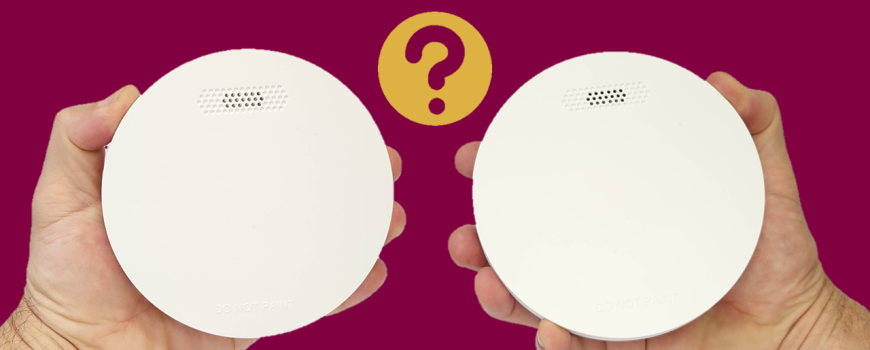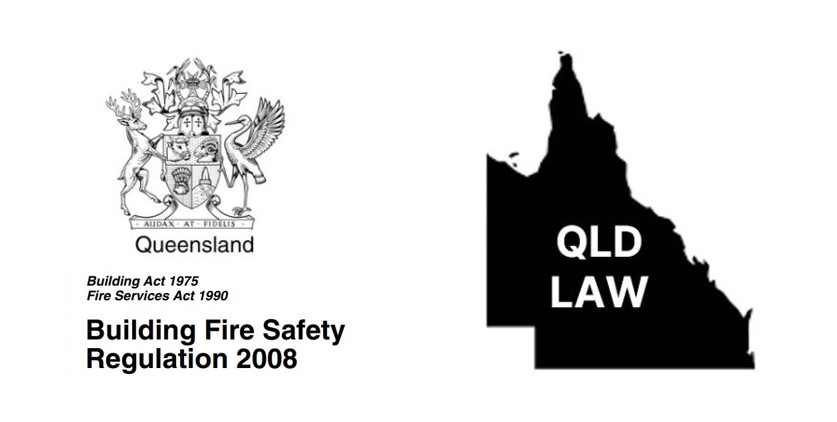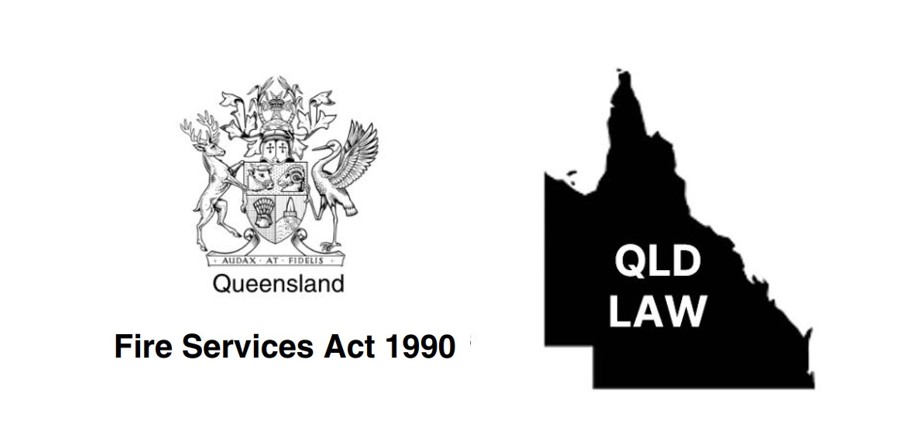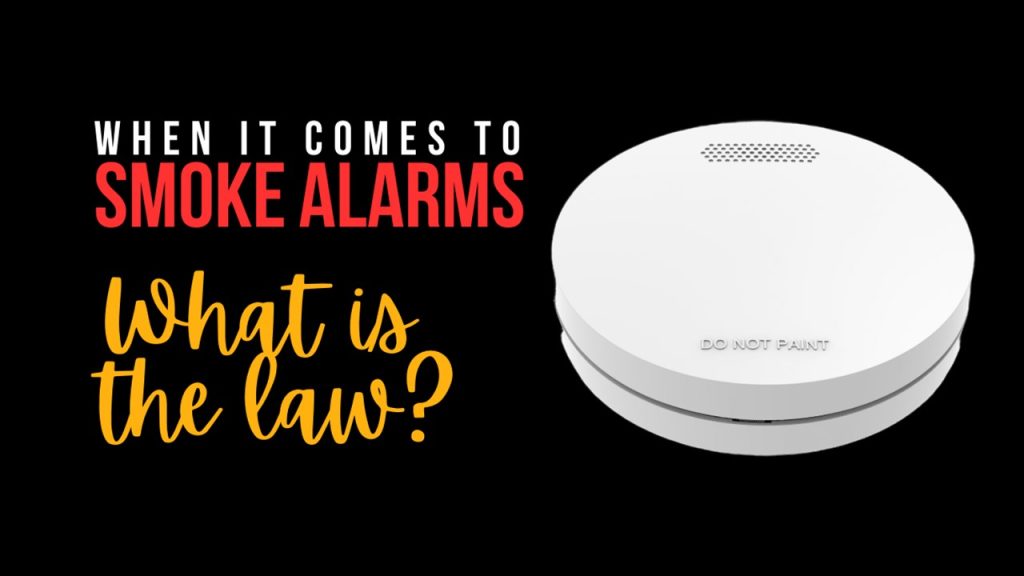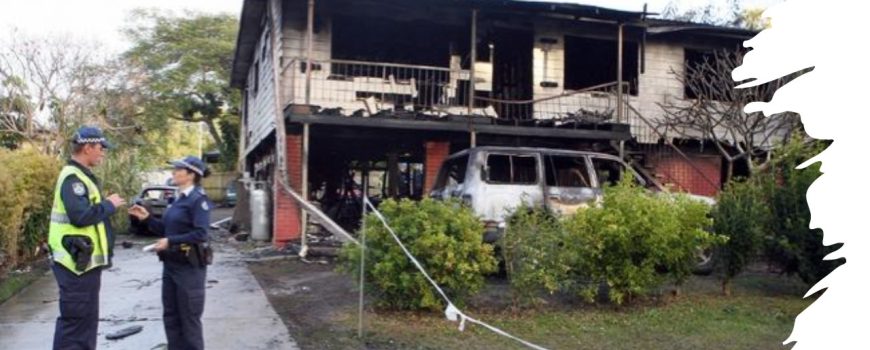Queensland is undergoing a phased roll-out of new smoke alarm legislation, culminating in 2027. It is unsurprising then that there is misinformation regarding smoke alarm requirements – particularly surrounding the installation of 10-year battery powered smoke alarms vs 240V hardwired smoke alarms.
Can I Install 10-year Battery Powered Smoke Alarms In QLD?
YES! you can. It is legal and perfectly acceptable to install 10-year battery powered smoke alarms in your Queensland home, provided you are not performing any of the 3 activities below;
- Constructing a new home
- Performing a substantial renovation
- Replacing an existing 240V hardwired smoke alarm
Prior to installing any smoke alarm it is important to understand their differences and when each type is permissible. Information contained in this article is sourced directly from the QLD Government. We encourage you to view and read the legislation for yourself too – direct links to all official government sources are included at the bottom of this article.
Queensland’s Building Fire Safety (Domestic Smoke Alarms) Legislation Amendment Regulation 2016 prescribes the legal ways of powering smoke alarms for domestic dwellings. It states that both 240V hardwired smoke alarms and 10-year battery powered smoke alarms are allowed. See the excerpt below;
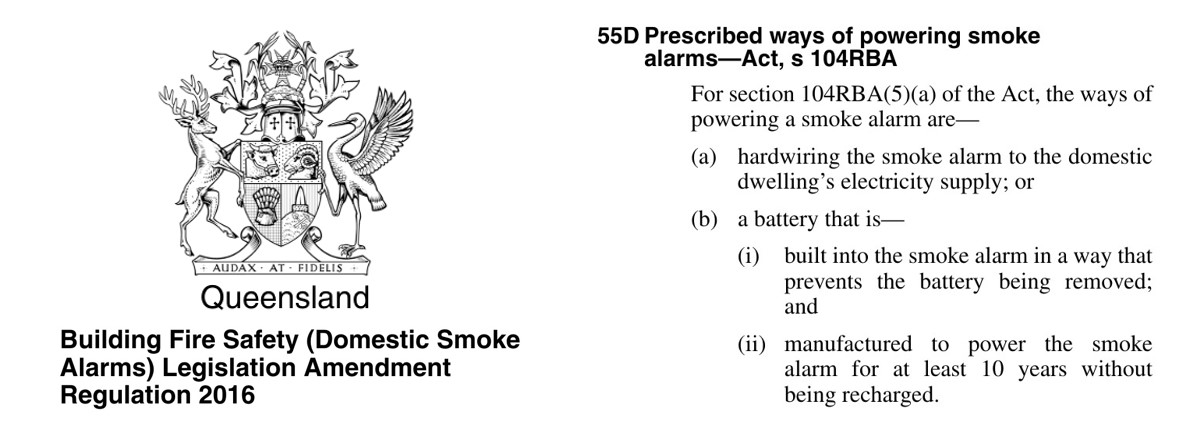
Queensland’s Fire Department website states that 10-year battery powered smoke alarms are acceptable, provided the three scenarios previously mentioned above are not being performed.

Advantages Of 10-year Battery Powered Smoke Alarms
- Wireless smoke alarms powered by a 10-year non-removeable battery can be easily DIY installed and don’t require the expense of an electrician.
- As the battery is sealed inside the smoke alarm (non-removeable) it lasts for the entire 10-year lifespan of the alarm and never needs to be replaced – no more annoying low battery chirp. After 10 years the whole alarm is simply swapped out for a new one.
- Added versatility through wireless RF interconnection. In some situations it is physically impossible to install 240V hardwired alarms – i.e. where there are solid concrete ceilings or no roof cavity.
Do QLD Smoke Alarms Need To Be Hardwired By 2027?
The short answer to this question is NO, they don’t. Although there are a lot of houses built in Queensland that require hardwired smoke alarms, there are just as many that have the option to use wireless 10-year battery powered smoke alarms and still be 100% compliant.
When Must I Install a 240V Hardwired Smoke Alarm In QLD?
There are 3 situations in Queensland where it is a statutory requirement for 240V hardwired smoke alarms to be installed in a domestic dwelling (and 10-year battery powered smoke alarms may not be used). Outside of these 3 scenarios it is acceptable to install 10-year battery powered smoke alarms in your home.
1) If You Are Constructing A New Home
If you are constructing a new home in QLD then hardwired smoke alarms are required as part of the building approval process. Queensland’s Building Regulation 2021 states that when constructing a new home, the smoke alarms must be hardwired to the domestic dwelling’s electricity supply.
2) If You Are Performing A Substantial Renovation
The Queensland Fire Services Act 1990 states that hardwired smoke alarms must be installed when a substantial renovation is being performed to a domestic dwelling.
3) If You Are Replacing An Existing Hardwired Smoke Alarm
The Queensland Fire Services Act 1990 also states that if a pre-existing smoke alarm being replaced was hardwired to the domestic dwelling’s electricity supply, then the replacement smoke alarm must be hardwired to the dwelling’s electricity supply.
Outside of the 3 scenarios described above, it is legal and perfectly acceptable in QLD to install wireless interconnected photoelectric smoke alarms which are
powered by a non-removeable 10-year battery.
Want to do some further reading? Links to all official sources in this article are provided below

QLD Building Fire Safety (Domestic Smoke Alarms) Legislation Amendment Regulation 2016
States that both 240V hardwired smoke alarms and 10-year battery powered smoke alarms are allowed in domestic QLD dwellings.
States that when constructing a new home in QLD, the smoke alarms must be hardwired to the domestic dwelling’s electricity supply.
QLD Fire and Services Act 1990 (formerly known as the QLD Fire and Emergency Services Act 1990)
States hardwired smoke alarms must be installed when performing a substantial renovation or replacing an existing hardwired smoke alarm.
QLD Fire Department website – 2027 Smoke Alarm Legislation Fact Sheet
States that smoke alarms must be either hardwired or powered by a non-removable 10 year battery, or a combination of both may be allowed.
States that existing hardwired smoke alarms that need replacement must be replaced with a hardwired smoke alarm.

Want to know more? Watch our ZEN quick start video or call us on 0478 596 402 today
We love talking smoke alarms!
ZEN Photoelectric Smoke Alarms
New Farm, QLD, 4005

